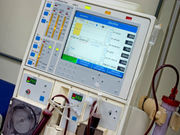Researchers suggest conservative care may be suitable option for some patients over 80
FRIDAY, March 18, 2016 (HealthDay News) — Dialysis does not significantly improve survival for elderly patients with end-stage renal disease (ESRD), according to research published online March 17 in the Clinical Journal of the American Society of Nephrology.
Wouter Verberne, M.D., of St. Antonius Hospital in Nieuwegein, Netherlands, and colleagues examined outcomes among older (≥70 years) ESRD patients in the Netherlands who received either dialysis (204 patients) or conservative care (107 patients).
Overall, patients with comorbidities died sooner than those without additional medical issues, the study authors reported. Among those ≥80 years of age, the investigators found no statistically significant difference in survival between dialysis and conservative care. The findings suggest that conservative care may be a reasonable option for some ESRD patients ≥80.
“We do not conclude that dialysis treatment should not be given to anybody ≥80 years or with severe comorbidity. But we show that the treatment is on average of little advantage regarding survival,” Verberne said in a journal news release. “Our next task is to predict who benefits and who does not. Until we are able to give a better prediction of the results of dialysis treatment at high age, we can merely suggest that conservative management is an option which should honestly be discussed when ESRD is approaching.”
Copyright © 2016 HealthDay. All rights reserved.








